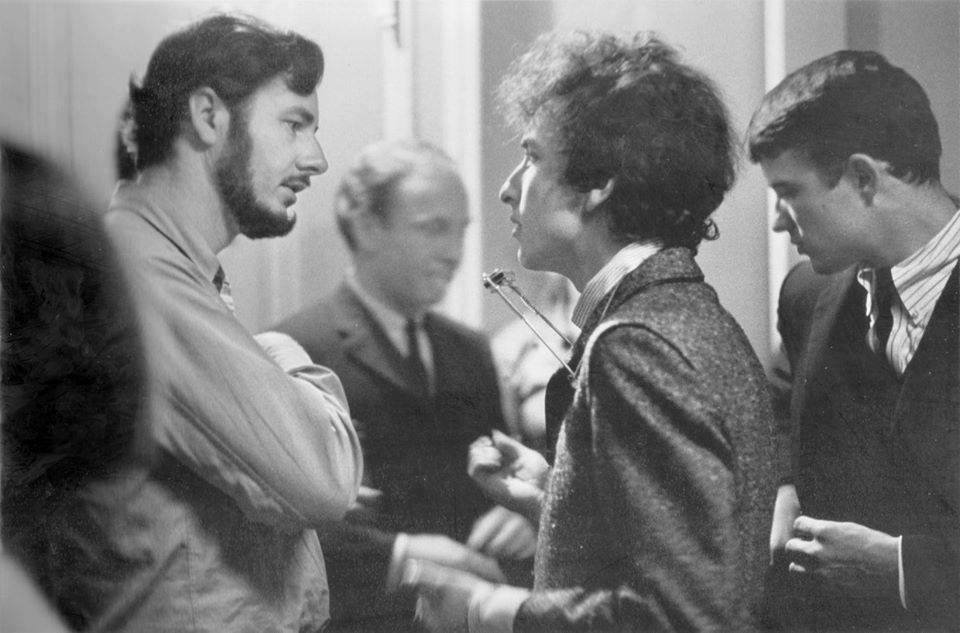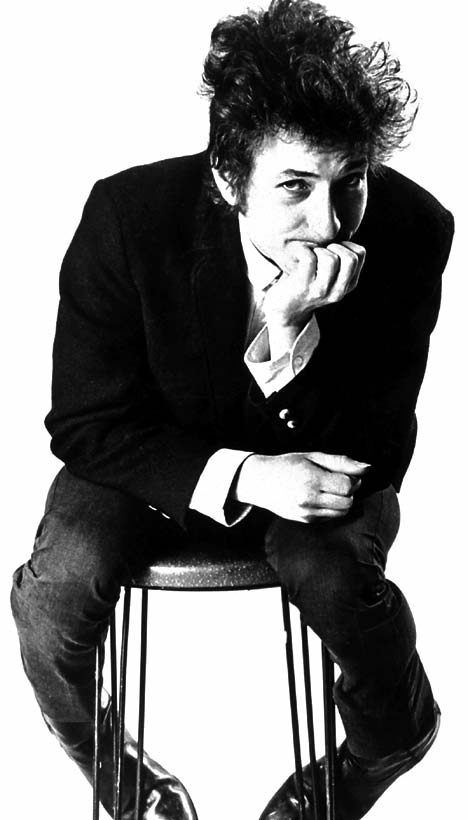
…
BD: Well, I don’t like to listen to too much country and western people. I like to listen to some of their songs…
NH: Yeah.
BD: …that they sing. But I get, oh, monotonized by listening to too many. I like Buck Owens’ songs, he’s alright. And Hank Williams and Joe Williams. There all the time, easily, you can make some sort of sound.
NH: Mm.
BD: But the other people are just the songs they sing. I think.
NH: How about in the rhythm and blues and rock n’ roll fields? Who do you especially, you know… who strikes you especially?
BD: Oh, you mean just name a name?
NH: Sure, just, you know, if you’re… almost like free association… if you’re thinking in terms of just pleasure in listening, who would you think of?
BD: I’d listen to all the Motown records. I listen to Wilson Pickett. Otis Redding, I guess. Charlie Rich.
…
Autumn 1965
Nat Hentoff (The Playboy) Interview
The Original Unpublished Version, New York City, New York
There are two versions of this interview, the original version which you’ll find on tape and the
published version which appeared in Playboy in March 1966. To call them versions ignores the
fact that they are totally different interviews.
~Every Mind Polluting Word
Part 1 – 46min
….
BD: Well, I never felt as if there’s an answer through pot. I don’t want to make this, kind of, a drug interview or anything, like. LSD like… once you take LSD a few times… I mean, LSD is a medicine. You know, you take it and you know… you don’t really have to keep taking it all the time. It’s nothing like that. It’s not that kind of thing, you know, whereas pot, you know, nobody’s got any answers through pot. Pot’s, you know, not that kind of thing. I’m sure that the people that say that the people who figure they got their answers through pot, first of all, those people who say that, they’re just inventing something. And the people that really actually think that they got their answers through pot, probably never even smoked pot, you know. I mean, it’s like… pot is, you know…who smokes pot any more, you know, anyway? Pot is…
NH: Getting back to music, you were saying that you liked the early Presley. I wondered about somebody like Johnny Cash. Now, how does he affect you? ‘Cause he’s the guy that said that…
BD: That’s a very funny thing to ask. I can’t really talk about it too much. I like Johnny Cash a lot. I like everything he does really.
…
Part 2 – 1h15min
Check out:
- Bob Dylan “The Rome 2001 Interview” (audio)
- Bob Dylan – The Klas Burling Interview, Stockholm, Sweden, 28 April 1966
- Bob Dylan – The classic “60 Minutes” interview with Ed Bradley 19 November 2004 (video)
-Egil


I have reason to believe it isnot Nat Hentoff in the photo but Paul Clayton
Can confirm.
Call for Papers
In 1999, Bob Dylan (b. 1941) was included in the ‘Time 100: The Most Important People of the Century’ as a “master poet, caustic social critic and intrepid, guiding spirit of the counterculture generation”. In 2008, the Pulitzer Prize jury awarded Dylan a special citation for “his profound impact on popular music and American culture, marked by lyrical compositions of extraordinary poetic power”. In May 2012, Dylan received the Presidential Medal of Freedom from President Barack Obama. In 2016, the artist was awarded the Nobel Prize in Literature “for having created new poetic expressions within the great American song tradition”. The New York Times (13-10-2016) reported: “Mr. Dylan, 75, is the first musician to win the award, and his selection on Thursday is perhaps the most radical choice in a history stretching back to 1901…In choosing a popular musician for the literary world’s highest honor, the Swedish Academy, which awards the prize, dramatically redefined the boundaries of literature, setting off a debate about whether song lyrics have the same artistic value as poetry or novels”. After the official Nobel announcement, opinions divided the public and critics. CETAPS (Centre for English, Translation and Anglo-Portuguese Studies) and CESEM (Sociology and Musical Aesthetics Research Center), NOVA University of Lisbon, decided to analyze and celebrate the aesthetic, historical, political, and cultural significance of Bob Dylan’s musical, literary and artistic (visual) work, as well as its influence(s).
The initial expression in the conference’s title is the title of the biographical musical drama film I Am Not There (2007, directed by Todd Haynes and co-written with Oren Moverman), which intercuts the storylines of seven different Dylan-inspired characters. According to Haynes, “the minute you try to grab hold of Dylan, he’s no longer where he was. He’s like a flame: If you try to hold him in your hand you’ll surely get burned. Dylan’s life of change and constant disappearances and constant transformations makes you yearn to hold him, and to nail him down. And that’s why his fan base is so obsessive, so desirous of finding the truth and the absolutes and the answers to him – things that Dylan will never provide and will only frustrate” (apud D. Dalton, Who Is the Man?: In Search of the Real Bob Dylan, 2012).
We will privilege comparative and transdisciplinary approaches. Potential contributors are invited to submit a bionote and a 300 word abstract on themes related to any of the following conference tracks:
• Influences in/of Dylan’s music;
• Bob Dylan and awards;
• The ‘power’ of the Nobel prize for literature;
• The alter-egos and personas of Robert Zimmerman/Bob Dylan (Blind boy Grunt, Bob Landy, Tedham Porterhouse, etc.);
• Dylan’s music videos;
• Dylan in/as performance;
• Dylan and religion;
• Art, activism, protest, and social unrest;
• Dylan on stage – presence, performance and liveliness;
• Dylanesque spaces and places;
• Influences in/of Dylan’s visual art;
• Intertextuality in Dylan’s lyrics, music and videos (text-music relationship);
• Intermediality in musical genres and practices;
• Lyrics as/and poetry/literary narratives;
• Dylan depicted (visual biographies, photography, press and record [album] covers, official website);
• Dylan in cyberspace (myspace, facebook, youtube, etc);
• Dylan’s songs;
• Dylan as trend-setter;
• Musical style(s) in Dylan;
• Bob Dylan in the classroom;
• Adaptation of Dylan’s texts as children’s literature;
• Dylan in/and translation;
• Dylan’s fandom;
• Academia and Dylan’s fandom;
• Music as a social and political agent in Dylan’s and other composers’ production;
• Dylan, music and the moving image (cinema, documentary, television, internet);
• The roles and ideologies of musical, literary and artistic criticism: after Dylan;
• Gender and music;
• Listening to Dylan: social behaviors, musical taste, consumption patterns.
Working languages: Portuguese, English, Spanish. No translation will be provided.
Papers and panels on the above themes are invited. However, papers/panels on other subjects related to the above topics will also be considered. Participants will be held to a twenty minute presentation limit. Please submit an abstract and a bio note, by 26 January 2017, to the conference email:
[email protected]
To ensure prompt notification, please include your e-mail address on your submission. If you are interested in chairing a session, please note this at the top of your abstract.
Registration fee: 80 euros. BA and MA students: 30 euros.
Conference website: https://internationalconferenceonbobdylanportugal2017.wordpress.com/